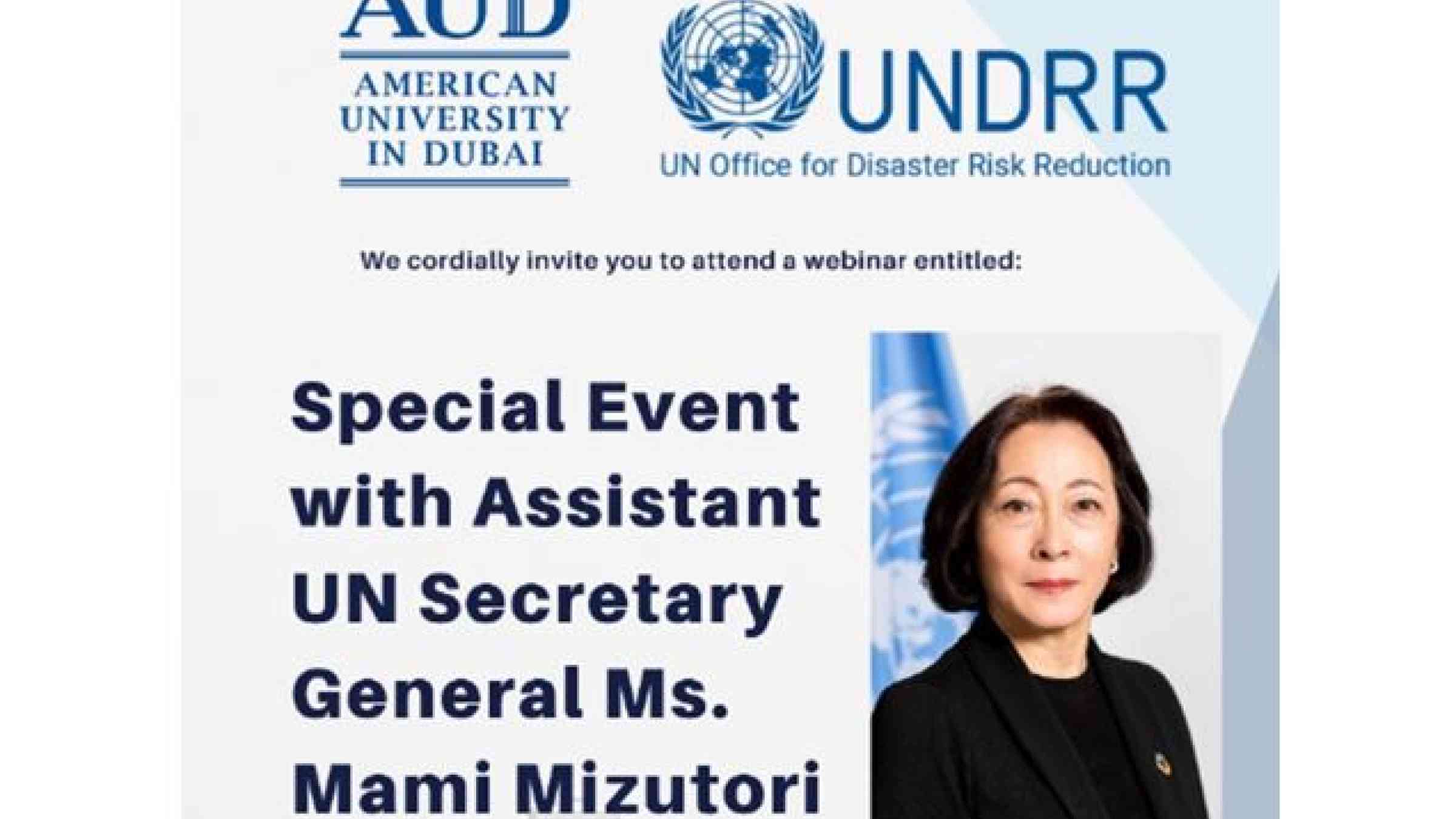Lecture on Disaster Risk Reduction for Business Resilience at the American University in Dubai

The American University in Dubai is organizing a special lecture led by Ms. Mami Mizutori, the UN Secretary-General’s Special Representative for Disaster Risk Reduction on Disaster Risk Reduction for Business Resilience: Why bother?
University Background: The evolution of the American University in Dubai began as a fact-finding mission in 1991 and signified the beginning of what was to grow to become one of the region’s most respected institutions for higher education. In 1995, Mr. Bou Saab officially established the American University in Dubai, with the full commitment and support of H.H. Sheikh Mohammed Bin Rashid Al Maktoum, Vice President and Prime Minister of the UAE, Ruler of Dubai. In October 1995, AUD opened its doors as a branch campus of the American College in Atlanta.
AUD grew progressively over the years and in 2000 the University became officially licensed by the UAE Ministry of Higher Education and Scientific Research (MOESR) while moving into its new fully equipped, purpose-built campus in an area that would soon be known as ‘New Dubai.
Today, the American University in Dubai is a fully independent, vibrant institution that serves as a point of reference for higher education within the Gulf Region and the greater Middle East. It currently educates more than 2,000 students of more than100 nationalities and remains the first institution outside of the U.S. and Latin America to receive accreditation from the Southern Association of Colleges and Schools Commission on Colleges (SACSCOC).
AUD is delivering a student-centric, forward-thinking learning experience to over 2000 undergraduates, graduates, and professionals from more than 100 countries worldwide, we seek to empower and enable the leaders and pioneers of tomorrow.
Lecture Background: The Sendai Framework states that addressing underlying disaster risk factors through disaster risk-informed public and private investment is more cost-effective than primary reliance on post-disaster response and recovery. In addition, reducing climate and disaster risk is a critical element for long term sustainable development. Trillions of dollars of new investments are expected in hazard-prone areas by 2030, dramatically increasing the global value of assets at risk. How disaster risk is considered and managed in capital investments, supply chains and operations will be a decisive factor in achieving the Sendai Framework targets. In line with the guiding principles on inclusivity and shared responsibility, the Sendai Framework recognizes and describes the critical role of all stakeholders, beyond states, in light of their competence and resources and thus potential contribution toward disaster risk management. Therefore, the Sendai Frameworks calls for new opportunities for partnerships and the strengthening of governance mechanisms at their various levels. The Sendai Framework recognizes that disaster risk reduction requires an all-of-society engagement and partnership. ARISE, the Private Sector Alliance for Disaster Resilient Societies is a network of private sector entities led by the UN Office for Disaster Risk Reduction (UNDRR). ARISE is a private sector initiative, which in conjunction with the UNDRR, works towards a resilient, prosperous future where fewer lives are lost to disasters, capital assets and investments are risk-informed, and infrastructure is resilient to natural and man-made hazards. Members voluntarily commit to support and implement the Sendai Framework Disaster Risk Reduction 2015 - 2030, aligned with the 2030 Agenda for Sustainable Development and its Sustainable Development Goals (SDGs), Paris Climate Agreement, New Urban Agenda, and Agenda for Humanity. In line with the ARISE initiative, the UAE business leader stepped up to establish the UAE chapter of the ARISE initiative in September 2020.
Youth under age 30 currently make up more than half the world’s population. They are the ones who will benefit the most from reducing the risk and impact of disasters, curtailing climate chaos, and achieving the global Sustainable Development Goals (SDGs). Engaging Youth on the Frontline of Disaster Risk Reduction and Resilience aims to ensure worldwide access to expertise, communities of practice, and networks of DRR practitioners. The guide offers five interrelated sections with specific advice on how to support and engage children and youth.
The main target audience of the lecture will be Master students from the Business school of AUD who are likely to be business executives and leaders of the future. It is of paramount importance to inculcate the significance of reducing and preventing disaster risk in future investments and development in general.
The main target audience of the lecture will be Master students from the Business school of AUD who are likely to be business executives and leaders of the future. It is of paramount importance to inculcate the significance of reducing and preventing disaster risk in future investments and development in general.
Lecture Objectives:
1- Introduction to the concept of Disaster Risk Reduction (DRR) and Sendai Framework 2015 – 2030
2- The role of the private Sector for disaster risk reduction and developing resilient communities
3- Understanding the need for urban resilience and the role of businesses (Introduction to Making Cities Resilience Programme 2030)
4- Youth engagement and their role as a stakeholder group for DRR
Language: English
Time: 12:00pm to 14:00pm (Dubai Time)
You may attend the lecture scheduled, December,8,2020 at 12:00 noon Dubai time (10:00 am Cairo time) through this link: https://us02web.zoom.us/j/88109574550

